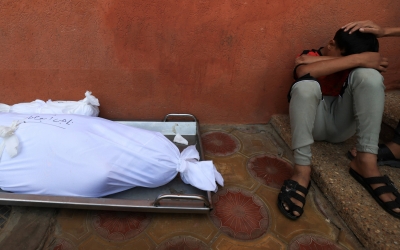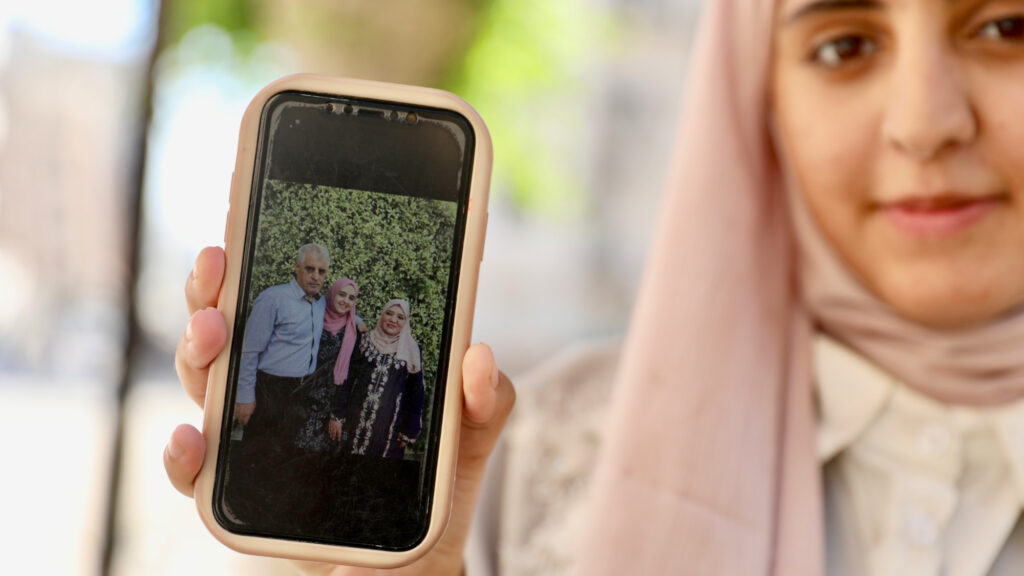Hungry, terrified, and crammed into a small apartment, as intense Israeli bombardment rocked the area around them.
This is how Hadeel Saleh and her family of nine spent several days in March 2024 during a violent Israeli raid on Gaza City’s al-Shifa hospital and the surrounding neighbourhood.
Their ordeal was interrupted by dozens of Israeli soldiers storming the home without warning.
Without hesitation, they shot and killed her 60-year-old Palestinian father. When her older brother rushed to help, he too was gunned down.
During the raid on the hospital, Israeli forces had put it out of service and then went door to door to neighbouring buildings, killing at will and forcing survivors to flee.
New MEE newsletter: Jerusalem Dispatch
Sign up to get the latest insights and analysis on
Israel-Palestine, alongside Turkey Unpacked and other MEE newsletters
More than a year after the devastating assault, testimonies continue to emerge.
Haunted by the trauma, Saleh has still not been able to return to the home where her father and brother were killed.
Standing just outside, she recounted to Middle East Eye what she described as the most nightmarish day of her life.
Al-Shifa hospital siege
Saleh, 21, said her family had been forced to flee multiple times during the first year of the war, after their home was destroyed in an earlier bombing.
Their most recent shelter was an apartment near al-Shifa hospital, located by the Haidar Abdel Shafi roundabout.
“Our situation was extremely difficult. It was our 10th displacement, and it happened during Ramadan,” she told MEE.
“Food was scarce, goods were almost entirely unavailable, and we had to leave all our belongings behind due to repeated displacements and the lack of transportation.”
In the early hours of 18 March 2024, the Israeli army launched a major raid on al-Shifa hospital, with intense air strikes and artillery fire targeting the surrounding neighbourhoods.
After encircling the area with tanks and military vehicles, Israeli troops stormed buildings near the hospital complex, carrying out field executions and, in less lethal encounters, forcibly expelling residents from their homes.
“Around 2:30am, we woke up to the sound of intense gunfire nearby, along with missiles, tanks, and heavy warplane activity,” Saleh recalled.
“We were terrified. We tried to find out what was happening, but couldn’t. We later learned it was a raid on al-Shifa hospital.”
Saleh and her family, like many others in the area, found themselves effectively under siege. For days, they were unable to leave their homes, let alone flee the area.
“Those days were incredibly hard. We couldn’t break our fast, couldn’t pray, and couldn’t even switch on a torch to see in the dark,” she said. “Soldiers were everywhere, and tanks were constantly moving. There was no way out.”
The family remained trapped in hiding for eight tense days before Israeli forces reached the residential building where they had taken shelter.
‘Executed at point-blank range’
At around 3am on 26 March, just as the family was preparing their suhoor, the pre-dawn meal during Ramadan, they were ambushed by more than 60 Israeli soldiers.
“They blew up the building’s entrance with sound bombs and explosives. We were on the ground floor. Then they blasted through our apartment door and stormed in, firing their weapons before even seeing us,” Saleh said.
All nine members of the family were huddled silently in a darkened room with the door closed. Another displaced family, mostly women and children, was also sheltering with them.
The only adult males present were Hadeel’s father, Mohammed Saleh, and her two brothers: Bilal, 28, and Salah, 18.
Moments later, the soldiers burst into the room.
‘He was immediately executed at point-blank range before he could say a single word’
– Hadeel Saleh, Palestinian woman
Saleh’s father stood to speak, attempting to explain that they were civilians and had children with them.
“He was immediately executed at point-blank range before he could say a single word,” Saleh recalled. “They shot him in the stomach.”
At first, the family hoped the wound was not fatal, as there was no visible blood when he collapsed.
Her brothers tried to pull him to safety, but then the soldiers opened fire again.
“They shot Bilal, first in the leg, then in the stomach,” she said.
Salah was cornered, beaten, and tortured, as the soldiers appeared to deliberate whether to kill him too.
After shooting the two men and preventing anyone from approaching them, the soldiers separated the women from Salah.
They then forced him to strip and began searching the apartment.
‘He made sure he was dead’
During the search of the apartment, one soldier noticed that Bilal was still alive and fired again.
“When he saw him breathing, he executed him with a bullet to the neck, right in front of Salah,” Saleh said. “He made sure he was dead.”
“I was in a state of utter terror. I was trembling uncontrollably and broke down from the horror of it all. We begged the soldiers to bring a doctor for my father, who had heart disease and diabetes, but no one responded.”

Survivors recount harrowing Israeli field executions in Gaza
Read More »
A few minutes later, a soldier returned and informed them that her father had died.
“We burst into tears,” she said. “The soldier shouted at us, telling us he had killed Bilal as well.”
After confirming the two men were dead, the soldiers asked the family who they were.
“That was the clearest evidence,” Saleh said. “They had executed my father and brother without even knowing who they were – civilians, killed in cold blood.”
When Salah told the soldiers the men were his father and older brother, one soldier turned to him and said, with sarcasm: “Now you’re the man of the house.”
Salah replied: “After you killed the man of the house, you say this?”
“They aimed their weapons at him, and had it not been for our repeated pleas for them not to kill him, he would have been executed too,” Saleh said.
‘Ramadan Kareem’
The surviving members of the family were ordered to leave the house and head south.
The women asked to change their clothes before leaving, but the soldiers insisted they do so in front of them. When they refused, they were forced to leave wearing only the prayer garments they had on.
“Before leaving, I asked about the fate of my father and brother’s bodies,” Saleh said. “They laughed at my question and forced me out.
“I was terrified they would burn the building with their bodies inside. I had heard of them doing that in other homes.
“Before we were evacuated, they told us they would blow up the apartment above us. The explosion was horrific. After the blast, they mockingly said, ‘Ramadan Kareem’,” a greeting commonly meaning “blessed Ramadan” used during the Islamic holy month.
‘We were in a miserable state, tears in our eyes, walking through pitch-black streets’
– Hadeel Saleh
After around two hours of horror, the family was forced to leave the bodies behind and flee.
“At exactly 5:10am, they pushed us out of the house. We were in a miserable state, tears in our eyes, walking through pitch-black streets, barely able to see,” she said.
“They threatened that if we didn’t head south, a tank would follow behind us and a drone would hover overhead.”
As they walked, they passed corpses scattered along the way, Saleh said. Eventually, they diverted their route and remained in Gaza City.
On 1 April, Israeli forces withdrew from their second major raid on al‑Shifa hospital, concluding a two-week operation that left hundreds dead or wounded, caused widespread destruction, and left bodies strewn across the hospital grounds and surrounding areas.
A few hours after the withdrawal, on 2 April, the family returned to the house to retrieve and bury the bodies of their loved ones.
They have not returned to live there since.


